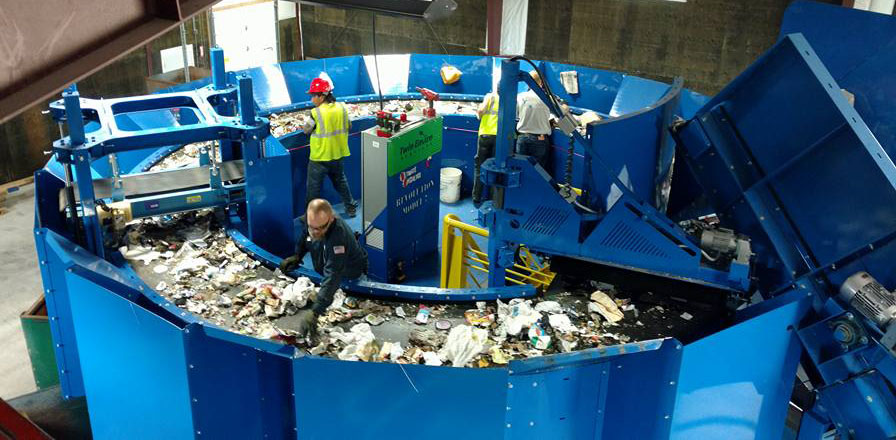
The Closed Loop Local Recycling Fund will help finance facilities that are modular and much smaller than a traditional facility, with a cost between $1 million and $2 million. | Courtesy of Revolution Recycling at Twin, Steamboat Springs, Colo.
A $35 million investment from PepsiCo Beverages North America will help Closed Loop Partners reach more people living in recycling deserts.
Most materials recovery facilities (MRFs) are designed to serve large communities with a high amount of material coming in. For smaller towns, the capital expense to develop a MRF is out of reach, and that fact “creates a big gap in a lot of the country,” Bridget Croke, managing director at Closed Loop Partners, told Plastics Recycling Update.
Closed Loop Partners is financing “mini-MRFs” through the Closed Loop Local Recycling Fund to help bring processing into areas where economics have hindered facility construction. Modular and much smaller than a traditional facility, they cost between $1 million and $2 million, Croke said.
“There’s this idea that oftentimes innovation means bigger and more technology, but in this case it’s building smaller and simpler,” she said. “It brings down the cost, creates jobs and allows us to sort the more critical material that has the highest value.”
A press release from the group noted that each system will have the capacity to sort at least 8,000 tons annually, including 400 tons of PET. The mini-MRFs are also expected to yield higher quality plastic while reducing the costs and greenhouse gas emissions of long-distance transportation.
Flexibility across the board
The smaller MRFs from will be modular, meaning they are easy to construct and have the potential to grow with a community if needed. They will use a circular sorting table for staff to manually sort items. While these models are permanent, Croke said the team does have a mobile version they’re exploring.
The details of each ownership and operating agreement will vary community by community to be as flexible and accessible as possible, but Croke said the idea is for the MRFs to ultimately to be owned by the municipality or hauler, with operating support from Closed Loop Partners.
“We don’t want to own these into perpetuity,” she said. “We want to release them into the world.”
Each facility will likely accept rigid plastics, PET, HDPE, paper, corrugated containers and some metals, Croke said, and then other materials based on the local market.
Croke said there’s already a mini-MRF operating in New Jersey, and Closed Loop Partners has a team working to identify communities across the U.S. that might be a good match.
Communities have also started reaching out to the team, Croke said. After an initial conversation with Closed Loop Partners to make sure it’s a good fit, municipal leaders fill out an application. The Closed Loop Local Recycling Fund could pay for the whole cost, but Croke said the team is hoping that communities can provide between 10% and 30% of the financing, to stretch out the fund’s effect.
Depending on finance agreements, Croke said she hopes to see between 30 and 50 mini-MRFs on the market based on PepsiCo’s initial investment. However, she said this initial investment might also inspire more companies to add to the fund.
It’s not just rural areas that could benefit, Croke said, but some larger cities are interested in having several smaller MRFs in neighborhoods, instead of one large central facility, to make transportation more efficient.
PepsiCo said in a press release that the effort supports the company’s goal of halving virgin plastic from non-renewable sources across its food and beverage portfolios by 2030, as more recycling facilities supply recovered PET.
“As companies – including PepsiCo – set ambitious goals to use more recycled content in their packaging, there is more need than ever for partnerships and investments to increase recycling in the U.S.,” said Jason Blake, PepsiCo’s chief sustainability officer. “We need to develop the infrastructure that makes recycling available to more Americans.”
PepsiCo recently gave $15 million to Closed Loop Partners’ Leadership Fund, a private equity fund that invests in companies that strengthen recycling infrastructure and build circular supply chains.
The size of the recycling fund investment of $35 million from PepsiCo is what will make change possible, Croke said, because bigger goals need bigger investments.
“That growth in investment … is a really important piece of how we’re going to get there,” she said. “And being willing to be creative and think about new models, not just investing in what exists today, but investing in how we need to build the system for the future.”
A version of this story appeared in Resource Recycling on Feb. 1.
More stories about markets
- Bale pricing bucks seasonal trend, trade alliances shift
- Trex, Mohawk, Indorama report Q1 earnings
- Haulers share how weather, tariffs impacted Q1